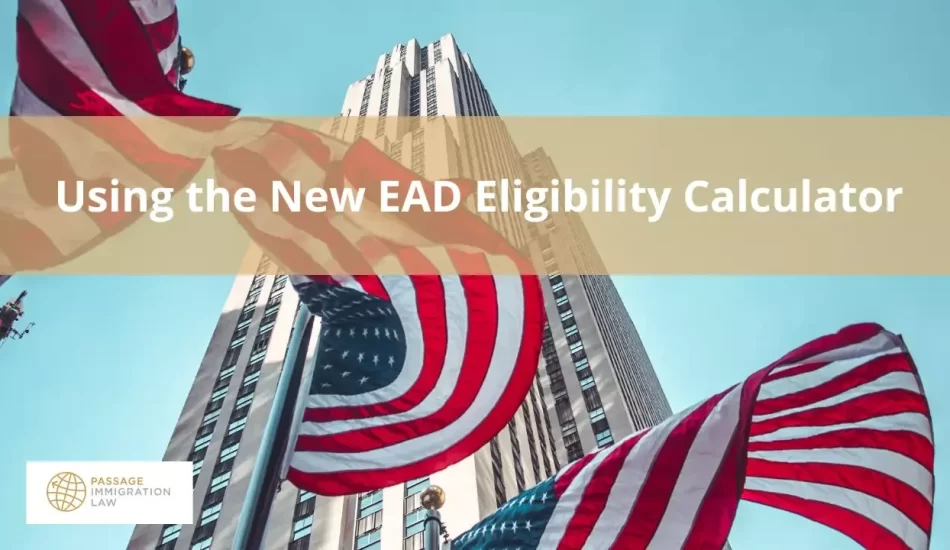Using the New EAD Eligibility Calculator

Earlier this month, the United States Citizenship and Immigration Services (USCIS) announced that certain applicants filing for a renewal of their Employment Authorization Documents (EADs) will now receive an automatic 540-day extension of their employment authorization while their renewal application is pending. You can read more about this ruling here.
However, many employers and employees may still find it confusing to determine exactly when EAD holders are eligible to work, especially with having to keep track of recent changes.
Thankfully, USCIS has now added a new online tool to help both employers and employees determine their exact employment eligibility periods.
Click here to use the new official EAD Automatic Extension Calculator.
This tool allows you to quickly determine your exact eligibility by simply answering a couple of questions about your eligibility category and expiration date(s). To make the process easier, be sure to have your most recent EAD card and most recent receipt notice on hand.
If you have any questions about calculating EAD extensions or preparing Form I-9 Employment Verification Authorizations in these situations, our attorneys are available to assist you. Call now at (503) 427-8243. Or, you can schedule a consultation here.
What You Should Know About EAD
An Employment Authorization Document (EAD) is usually referred to as a ‘work permit,’ or (officially) a Form I-766. Through this document, you can establish that you’re eligible to work lawfully in the United States. Those who have submitted applications for obtaining a green card while living in the United States may get an EAD so they can work while their application is processing. Only USCIS can award EADs. If you’re currently a non-resident and are seeking work in the United States, contact our immigration experts for more information.
Who Requires an EAD?
Some of the individuals who may qualify for employment authorization documents are:
- Employment-based nonimmigrants
- Family-based nonimmigrants
- Citizens of certain nationalities
- EAD applicants who have already applied for a status adjustment
- Refugees
- Asylees
- Foreign students
To get a work permit, as mentioned, you’ll need to file Form I-765, otherwise referred as an Application for Employment Authorization. If you already possess a green card, or if you’re employed in the United States with a nonimmigrant visa (such as an H-1B), you don’t need to apply for an EAD, as your visa already permits you to live and work in the US. However, if you’re waiting for your asylum application or green card to go through, or if you’re in the US on a nonimmigrant visa that permits you to work but requires you to get an EAD, then you may be eligible to submit an Application for Employment Authorization.

How to Calculate EAD Automatic Extensions
Understanding EAD extensions may be challenging for some of you. Before you can figure out whether one of the different extensions applies, you should identify the EAD category.
Particular EAD applicants are 180-day automatic extensions if they have pending EAD renewal applications that were filed in a timely manner. The code on the face of the expired EAD shows eligibility. Eligible applicants include:
- Code A07: Parent or dependent child of an international organization employee granted permanent residence
- Code A10: An individual granted withholding, deportation, removal
- Code A08: Citizens of Micronesia, the Marshall Islands, or Palau admitted as nonimmigrants
- Code C08:Certain asylum applicants
- Code C09: Adjustment of status applicants
- Code C20:Special agricultural workers
- Code C222: Legalization applicants under INA 245A
- Code C16: Registry applicants
- Code C24: LIFE applicants
- Code C31: VAWA beneficiaries and children
- Code C10: NACARA applicants for suspension of deportation or cancellation of removal
- Code A12 and C19: Temporary Protected Status (TPS) beneficiaries
- Code A03: Refugees
- Code A05: Asylees
On May 4, 2022, USCIS announced they were increasing the automatic extension time for employment authorization document (EAD) renewal applications from 180 to 540 days for certain categories. Individuals who are entitled to 180-day automatic extensions 540-day automatic extensions if:
- You have pending EAD renewal that was filed in a timely manner, even if your 180-day extension has already expired.
- You filed an EAD renewal application in a timely manner between May 4, 2022, and October 26, 2023.
- You’re seeking a renewal in the same category as the expired EAD, except for TPS beneficiaries, who may mix and match codes A12 and C19.
What Should I Do If I Lose My EAD?
If your EAD is stolen, destroyed or lost, you may simply pay a filing fee and file a new Form I-765. However, if you seek a fee waiver, upon approval you may not need to pay the fee. Additionally, if you realize your EAD has incorrect or false information due to an error on USCIS’s part, you may submit the card with false information, a clear explanation of what was not right, and supporting documentation including the correct information and waive the additional filing fee. These documents are very vital, so reach out to our immigration lawyers with any concerns or queries.
If you’re looking to get, renew, or replace an EAD, contact our firm right away to speak with an experienced and dedicated immigration attorney.
Contact our Experienced Immigration Lawyers
With the legal representation of our expert immigration attorneys from Passage Immigration Law, our clients can remain in the United States and build lives for themselves while seeking legal status. We prepare documents on our clients’ behalf and provide expert advice on what to expect. We know that the time between initiating an application and getting its results can be highly nerve-wracking. Our goal is to ease our clients’ emotional burdens by providing them with an EAD so they can live and work while waiting for their immigration applications to be approved.
We understand what is at stake when it comes to immigration law matters, which is why if you have any queries, you should not hesitate to call us at (503) 427-8243. Or, you can schedule a consultation with our firm today by clicking here.
